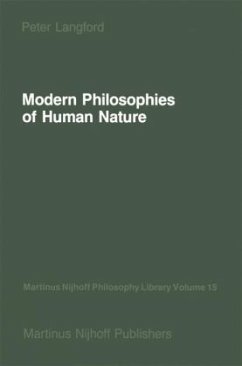P. LangfordModern Philosophies of Human Nature
Their Emergence from Christian Thought
1: Introduction.- The decline of Christianity as the key factor producing altered views of human nature; discussion of other views and delimitation of the scope of the coverage..- 2: Unreason and Self-Destruction.- Augustine s pessimistic view of human nature and its influence, particularly on the reformation of the sixteenth century..- 3: Reason and Self-Interest.- The more optimistic view of some scholastic philosophers and its development by metaphysical rationalism, British empiricism and Kant..- 4: The Origins of Modernism.- Origins of the idea of the unconscious and of a philosophy based on consciousness; coverage of some writers who directly influenced the writings of Nietzsche, Freud, Heidegger and Sartre..- 5: Nietzsche and Jaspers.- Nietzsche s emphasis on the overcoming of lower nature and the ruthlessness of creation; his use by Jaspers and others..- 6: Freud and his Followers.- Freud s invention of psychoanalysis, his use of deep interpretation and extension of the stoic attitude; his influence on Reich, Marcuse, Fromm and Lacan..- 7: Heidegger and Modern Metaphysics.- Heidegger s use of a metaphysics of consciousness and his neglect of lower nature; the extension of his ideas by Sartre, Merleau-Ponty and Baudrillard..- 8: Conclusions.- Against excessive reliance on methodology; critique of post-structuralism; review of seven issues relating to human nature..

